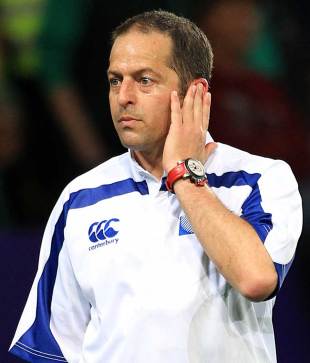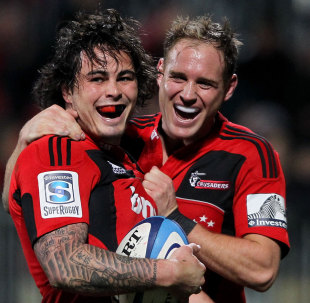|
Super Rugby Qualifiers
Ironing out the ambiguity
Tom Hamilton
July 23, 2012

Jonathan Kaplan is in the spotlight after the high profile incident at the weekend
© PA Photos
Enlarge
The officials are never far from the headlines in Super Rugby and once again they will dominate the talk in the run-up to the semi-finals of this prestigious competition. There was some breathtaking rugby on display in both play-off matches at the weekend but questions have to be asked of Jonathan Kaplan's handling of Liam Gill's try that wasn't in the 56th minute of the Reds' clash with the Sharks. The final round of Super Rugby saw controversy in the Crusaders' tussle with the Western Force. The Crusaders scored two tries that weren't with Israel Dagg dropping the ball over the line and Andy Ellis grounding the ball before the line, but the TMO, bizarrely, ruled in favour of the home side. It had no affect on the Force's woeful campaign but it is small margins like that that reverberate around the rest of the league. SANZAR officials, supporters and players alike would have hoped for this past weekend to have passed by with the headlines being made solely by the players and not by the officials. And up to the 56th minute of the Reds' match with the Sharks, it looked like they had their wish. The Reds were second-best to the Sharks with the Durban-franchise 17 points ahead with a 27-10 lead. But the Queensland-franchise were hammering away at the Sharks' line and despite having the world's premier scrum-half Will Genia forced to fill in at fly-half, they were showing impressive tenacity. Then Digby Ioane charged to the line. He fell short but team-mate Gill grasped the ball, bundled over the line and scored a perfectly good try - but Kaplan asked the TMO "I'd like to know if on the first grounding the try was scored?" referring to Ioane's effort not the subsequent phase. It was not the standard "try, yes or no?" or "is there any reason why I cannot award the try?" It was a call that bemused players and commentators alike with Rod Kafer all too quick to put the boot into Kaplan. But the former Australian international was correct. Kaplan's - who refused to hand out yellow cards to the Sharks when they were infringing in the red-zone repeatedly - manipulation of the question weighed it firmly in favour of the Sharks and of course the TMO, still operating under its' limited powers before the new changes are trialled, ruled that - correctly - Ioane failed to ground the ball with Gill's subsequent effort ignored. It is flippant to suggest that the whole match hinged around this moment; the Sharks were playing some fantastic rugby with J.P. Pietersen at the forefront of everything they were doing well and were deserved winners. And their feat of downing the reigning champions in their own backyard should not be sniffed at but it is calls such as Kaplan's which always take the gloss of the performance. It is a facet of the game that is becoming ever more frustrating for those involved with Genia saying after the match: "I thought we scored a try off Gill's pick and go, but I don't understand how it wasn't conclusive. I felt if we got that try we were back in the game - it's very disappointing to finish on a sad note like that." Refereeing and TMO controversies aside, it is the Sharks who march on and will face the Stormers in the all-South African affair next weekend. The Chiefs and the Stormers - the top two seeds - were the tournament's most consistent sides over the 18 rounds of conference rugby but both of them must be keeping a watchful eye on the Durban side and perhaps more worryingly, the Crusaders. Super Rugby must be sick of the sight of the Christchurch-based franchise. At their best, they are simply irresistible. They say familiarity breeds contempt and while this might be the said for the other 14 teams in the tournament when it comes to facing the Crusaders, Todd Blackadder's men seem to be revelling in the same ethos and style of rugby that has seen them make the semi-final stage of the competition on 11 successive occasions.

It's all smiles for the Crusaders at the moment
© Getty Images
Enlarge
Their opponents last Saturday evening, the Bulls, have also experienced a spell of dominance in the southern hemisphere's premier rugby tournament but while they are currently rebuilding after losing the likes of Fourie du Preez, Victor Matfield and Bakkies Botha, the Crusaders constantly evolve. They lost Brad Thorn at the end of last season but Luke Romano seamlessly stepped into the void at both club and international level. Sonny Bill Williams moved on to the Chiefs but Robbie Fruean, although he has been with the side for a while, has excelled scoring five tries this campaign. While some of the Crusaders' personnel changes from season to season, their well-known players are also evolving. Richie McCaw has been used at No.8 this season and Dan Carter has also added a new aspect to his game - the drop-goal. Up until the recent Test against Ireland in June, Carter had only hit four drop-goals for the All Blacks. But he has seemingly developed a taste for the points-generating mechanism that has largely been favoured by their South African rivals and Carter has now hit two in his last three games for the Crusaders. That's the difference between the Crusaders and other teams. They are not afraid of changing their approach, breaking away from traditional values for the pursuit of greatness and backing their system of recruitment and player retention - it cannot be ignored that the likes of McCaw, Carter and Kieran Read seem reluctant to play their rugby elsewhere other than Christchurch. It's now time for the other stakeholders in the game to replicate the Crusaders' methods and look to evolution rather than complete revolution. This must start with the officials. TMO's need to be given the power to overrule the referee - so in Saturday's instance, he should have been able to say to Kaplan that the second phase resulted in a try. TMO's are there for a reason, they are specialists. If the straightjacket method of contact between the referee and the man in the truck is slightly loosened - to allow both parties to get out of the slow-mo replays exactly what they require - then the game will reap the benefits. © ESPN Sports Media Ltd. Tom Hamilton is the Assistant Editor of ESPNscrum.
|
Live Sports
Communication error please reload the page.
-
Football
-
Cricket
-
Rugby
-
- Days
- Hrs
- Mins
- Secs
F1 - Abu Dhabi GP
Abu Dhabi Grand Prix December 11-131. Max Verstappen ()
2. Valtteri Bottas (Mercedes)
3. Lewis Hamilton (Mercedes)
4. Alexander Albon ()
5. Lando Norris ()
6. Carlos Sainz Jr ()
-
ESPNOtherLive >>
Snooker - China Open
Tennis - Miami Open

